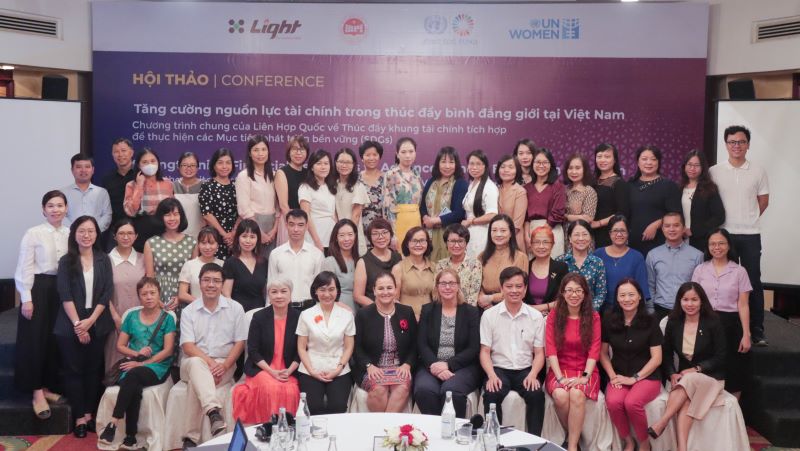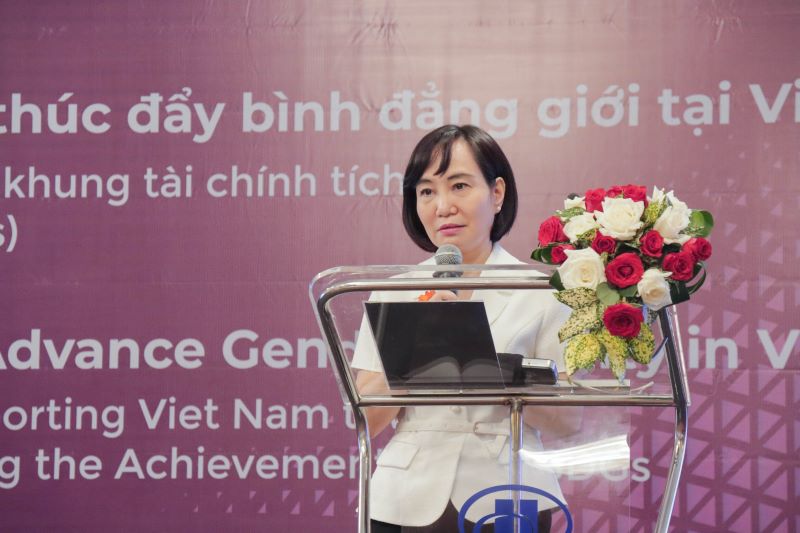Vietnam needs financial resources to advance gender equality
The financial shortage might challenge the implementation of Vietnam’s gender equality commitments and Sustainable Development Goals by 2030.
It is extremely urgent to secure and mobilize domestic financial resources for gender equality in Vietnam in the context that a great number of donors have cut down on financial support once the country is in middle-income status.
Elisa Fernandez Saenz, United Nations Entity for Gender Equality and the Empowerment of Women (UN Women) Country Representative in Vietnam raised concerns at a conference held in Hanoi on August 17.
| Elisa Fernandez Saenz, United Nations Entity for Gender Equality and the Empowerment of Women (UN Women) Country Representative in Vietnam, speaks at the conference held in Hanoi on August 17. Photos: UN Women |
The idea was shared at the event where the United Nations agencies, international organizations, local authorities, businesses, and civil society organizations (CSOs) called for initiatives and cooperation to strengthen domestic financial resources to advance gender equality in Vietnam.
The activity was jointly held by UN Women in collaboration with the Ministry of Planning and Investment (MPI) and the LIGHT Institute for Development & Community Health (LIGHT Institute).
It is part of the UN Joint Program on “Supporting Vietnam towards the 2030 Integrated Finance Strategy for Accelerating the Achievement of the SDGs” led by MPI with technical support from the United Nations agencies in Vietnam. The program is funded by the SDG Fund.
Over the years, Vietnam has obtained significant achievements in advancing gender equality and empowering women. However, one of the biggest challenges currently affecting the implementation of Vietnam’s gender equality commitments and SDGs has been the shortage of financial resources.
To help the country in this field, UN Women has advocated and introduced tools to incorporate gender equality issues into national planning and financial policies during the implementation of the SDGs to ensure that gender equality commitments will be realized, Elisa Fernandez Saenz emphasized.
| Participants at the event. |
Although 2015 revised State Budget Law has demonstrated progressive changes when introducing the principle of promoting gender equality in state budget expenditure, so far, the implementation has faced numerous challenges.
For that reason, the participants discussed the role of various stakeholders, including the private sector, CSOs and raised the major difficulties in strengthening financial resources for gender equality in the country, such as the lack of planning and budgeting processes, shortage of tools and guidelines, limited understanding of gender-responsive budgeting (GRB) approach, the absence of sex-disaggregated data, and lack of tracking and labeling of expenditures aimed for gender equality in financial statements.
The participants also discussed the roles of relevant ministries such as MPI, the Ministry of Finance, the Ministry of Labor, Invalids and Social Affairs, CSOs, and the private sector, meanwhile putting forward initiatives and solutions to increase financing for gender equality. In particular, the highlight is how to apply gender-responsive budgeting (GRB), and how to ensure that the needs of women, men and other groups are fully taken into account throughout the entire budget cycle.
All of us – no matter which organization we come from or where we live, share the same desire and the same goal – that is contributing to the successful realization of gender equality and national development objectives, said Nguyen Thu Giang, Deputy Director of LIGHT Institute.
Regarding gender equality among entrepreneurs, the International Finance Corporation (IFC) said Vietnam faces acute challenges in financial inclusion and gender equality. Women own 21% of formal enterprises in Vietnam and earn nearly the same as businesses run by men, yet lack equal access to capital. The financing gap for women-led small- and medium-sized enterprises (WSMEs) in the country is estimated at US$6.2 billion. Barriers include the lack of formal financial records, lack of access to collateral, and no differentiated financial products for women-led businesses.
| Nguyen Thu Giang, Deputy Director of LIGHT Institute, at the event. |
Hanoi is one of the leading localities in implementing policies on gender equality as it believes that gender equality and the advancement of women. In 2022, the Hanoi People’s Committee issued a plan on gender equality by disseminating the policy among different stakeholders and boosting the enforcement of Law on Gender Equality, Law on Domestic Violence Prevention and Control, and the National Strategy on Gender Equality 2021-2030. The Light Community Health Development Institute (LIGHT), the Hanoi-based non-governmental, non-profit and humanitarian organization has conducted projects to contribute to improving the quality of life, the health status of people, and improving the social conditions of disadvantaged groups. |

.jpg)









